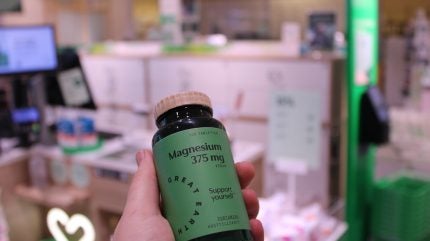
Sustainability has become a cornerstone for modern retail and e-commerce, with consumers driving demand for eco-friendly products and packaging. Retailers are responding by adopting innovative solutions, such as fibre-based caps, that align with these expectations.
A prominent example is the introduction of a recyclable fibre cap by Great Earth for its Magnesium product, developed in collaboration with Swedish start-up Blue Ocean Closures.
“It is crucial that actors at all levels take responsibility and develop solutions to drive sustainable development,” says Amelia Sjöberg, Sustainability Developer at Apotek Hjärtat. She highlights the success of this packaging innovation: “Great Earth’s Magnesium, with a new fibre cap, is a good example of that.”
The shift was met with immediate consumer enthusiasm, as the Magnesium product sold out within days of its launch.
This underscores a growing appetite for alternatives to plastic, with consumers valuing packaging that is both environmentally friendly and practical.
Packaging as a sustainability communicator
Packaging plays an increasingly vital role in signalling sustainability to consumers. The decision to replace plastic caps with fibre-based alternatives demonstrates not only technical innovation but also a strong commitment to environmental responsibility.

US Tariffs are shifting - will you react or anticipate?
Don’t let policy changes catch you off guard. Stay proactive with real-time data and expert analysis.
By GlobalData“We need to reduce the use of plastic where we can and help our customers make conscious choices,” Sjöberg explains. “The closure is recyclable and made from renewable resources, which is in line with our packaging strategy.
It will also be a discussion starter about sustainability in the meeting with the customer.”
This example highlights how packaging can go beyond its traditional function of protecting and presenting a product. It has become a medium for brands to convey their sustainability credentials, offering a tangible example of how businesses can take action against plastic pollution.
Industry response and future opportunities
The response from retailers and consumers alike has been overwhelmingly positive. Andreas Lundberg, Sales Manager at Great Earth, notes that the switch to fibre-based closures has opened new doors.
Switching to a more environmentally friendly closure has not only led to a great response from customers, but also opened doors for new collaborations and growth opportunities,” he says.
Such developments reflect the broader potential of sustainable packaging innovations. Companies like Blue Ocean Closures are at the forefront of this transformation, offering solutions that are biobased, biodegradable, and scalable.
Backed by major industry players like ALPLA and Glatfelter, the company is helping brands achieve their sustainability goals while addressing the global plastic waste crisis.
As businesses increasingly prioritise environmental responsibility, fibre-based caps serve as a reminder that innovation in packaging can deliver both ecological and commercial benefits.
By embracing these solutions, the packaging industry is not only reducing its carbon footprint but also setting a precedent for sustainable commerce.



